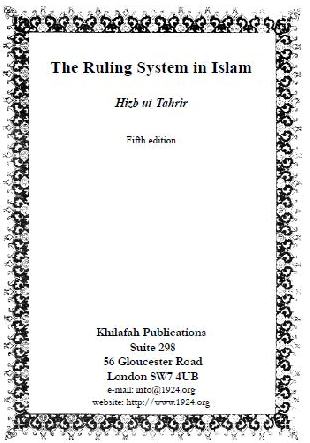- |
- font size decrease font size increase font size
بسم الله الرحمن الرحيم
The Ruling System in Islam
Hizb ut Tahrir
1417 AH - 1996 CE
Download PDF version: Cick Here

| TABLE OF CONTENTS | |
| Foreword | 7 |
| Introduction | 10 |
| Ruling in Islam | 12 |
| The Islamic State | 18 |
| The principles of ruling | 43 |
| The structure of the state | 50 |
| The Khilafah "Caliphate" State is a human state not a theological state |
127 |
| Leadership in Islam is singular and not collective | 139 |
| The Khaleefah's assistants | 144 |
| The Ameer of Jihad | 158 |
| The Army | 167 |
| The Governors | 189 |
| Judiciary | 202 |
| The Administration System | 228 |
| The Council of the Ummah | 237 |
| Islam must be implemented as a whole. Gradual implementation is Haram |
265 |
| Islam forbids ruling by a police state | 270 |
| Establishing political parties is Fard Kifayah | 295 |
| The guarantee of the implementation of Islam | 299 |
Introduction
Allah (swt) has revealed the Message of Islam, and based it on the ‘aqeedah of Tawheed, which is the belief in "there is no God but Allah, Muhammad is the Messenger of Allah." It is a general and comprehensive Message sent to all mankind. It determines all life's affairs and all relationships, past, present and future. The Message offers the solutions to all the human problems, and determines man's relationship with his Creator, with himself, and with his fellow human beings, at all times and places.
The Islamic Message has provided answers regarding the relationship of Allah (swt) with the universe, with human beings and with life as a whole. It has dealt with issues of creation and its control, life and death, guidance and misguidance, provision and help, and all the other powers associated with Allah (swt), such as omnipotence, perfection, absolute control, free disposition, supreme knowledge over all creatures and free will over all possibilities.
The Islamic Message has also provided answers regarding the relationship of human beings and lives that they lead, with Allah (swt), the Creator, emphasising the obligation of worshipping Him (swt) alone and associating none with Him (swt), abiding only by His (swt) Decrees to the exclusion of all others, and executing His (swt) commands and avoiding His (swt) prohibitions. It also emphasised the obligation of following only the Messenger of Allah, Muhammad (saw), obeying him and adopting his teachings to the exclusion of all other people.
The Islamic Message has brought specific and determined concepts that in turn created a distinguished civilization (hadharah) by which it outlined the whole concept about life and crystallised the perceptions of those who embraced it within the framework of that civilisation. This Message has provided a viewpoint about life, which is the Halal and the Haram, and a specific way of living. It has established a society distinct in its concepts, emotions, rules and the personalities of its individuals.
The Islamic Message has brought a complete legislative system that determines the relationships of the state with society, whether regarding ruling, economics, social, educational, domestic and foreign policy, or whether those relationships relate to the public relationships between the state and its subjects or the state and other states and nations, in times of war or peace. It also determined the private relationships between individuals in society.
It is therefore a complete and comprehensive system, designed for mankind, which made it obligatory on Muslims to implement and execute it in a state that takes a specific shape, represented by the system of Khilafah "Caliphate".




